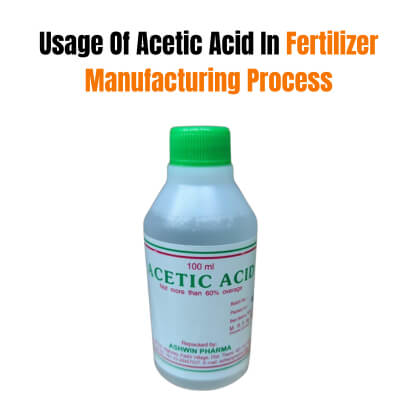
Acetic acid (CH₃COOH) is a versatile chemical with several applications in various industries, including the production of fertilizers. Acetic acid is used to produce acetate salts, such as ammonium acetate, calcium acetate, and potassium acetate. These salts can serve as nutrient sources or soil conditioners in fertilizers. For example, potassium acetate is used as a potassium source in liquid fertilizers.
In the synthesis of some complex fertilizer compounds, acetic acid is used as a solvent or a reactant to facilitate chemical reactions. Acetic acid can be used to adjust the pH of solutions. In some fertilizer formulations, maintaining the correct pH is crucial for the stability and availability of nutrients.
Microbial Biomass Production: Acetic acid can be utilized as a carbon source in the fermentation process to produce microbial biomass. This biomass can then be processed into bio-fertilizers. Acetic acid aids in cultivating beneficial microorganisms that are integral to soil health and nutrient cycling.
Chelating Agent: Acetic acid can act as a chelating agent, helping to bind essential nutrients and make them more available to plants. For example, it can form complexes with metals such as iron, zinc, and manganese, which are crucial micronutrients in fertilizers.
Preparation of Acetate Fertilizers: Acetic acid is used in the preparation of acetate fertilizers, such as calcium acetate and potassium acetate. These acetate compounds can provide essential nutrients to plants while also improving soil conditions.
Organic Farming: In organic agriculture, acetic acid is used as a natural herbicide. Its application can help control weeds, thereby promoting healthier crop growth and leading to better use of organic fertilizers.
pH Adjustment: Acetic acid is sometimes used to adjust the pH of nutrient solutions in hydroponic systems or liquid fertilizers. Maintaining the correct pH ensures that nutrients remain soluble and available for plant uptake.
Production of Vinegar Fertilizers: In some niche markets, vinegar (which contains acetic acid) is used as a foliar spray to provide minor nutrients to plants. This practice is more common in organic and home gardening.
For Registration Visit: Fertilizer Manufacturing & Trading License
The guidelines outlined in the Order of 2019 from the Ministry of Chemicals and Fertilizers, Department of Chemicals and Petrochemicals, for using acetic acid in farming are as follows:
Concentration Limits: Specific limits on the concentration of acetic acid that can be used in agricultural applications to ensure safety and efficacy.
Application Methods: Approved methods for applying acetic acid in farming, such as foliar spraying, soil treatment, or incorporation into irrigation systems.
Safety Measures: Required safety protocols for handling and applying acetic acid include the use of personal protective equipment (PPE) and measures to prevent environmental contamination.
Usage Restrictions: Restrictions on the types of crops and farming practices where acetic acid can be used, including any prohibitions on its use in certain sensitive environments or crop types.
Environmental Impact Assessments: Requirements for assessing and mitigating the environmental impact of using acetic acid in agricultural settings, including runoff and soil health considerations.
Record-Keeping: Obligations for farmers and agricultural professionals to keep detailed records of acetic acid usage, including quantities, application dates, and observed effects on crops and soil.
Compliance and Inspections: Procedures for ensuring compliance with the guidelines, including periodic inspections and penalties for non-compliance.
For Fertilizer License in Haryana, click HERE
For Fertilizer manufacturing license in Maharashtra, click here
To apply for fertilizer license in Karnataka, click here





We are the pioneers in offering environmental consulting services to our patrons, giving us the first mover advantage & keeping us ahead of our competitors.
Very experienced in filing, monitoring & issuance of CDSCO Certificates, Drugs Licensing, Environmental Impact Assessment, AERB certificates, Pollution Control Board CTE & CTO, Waste Management Authorization from State Pollution Control Boards, Fertilizers & Insecticides Licensing
